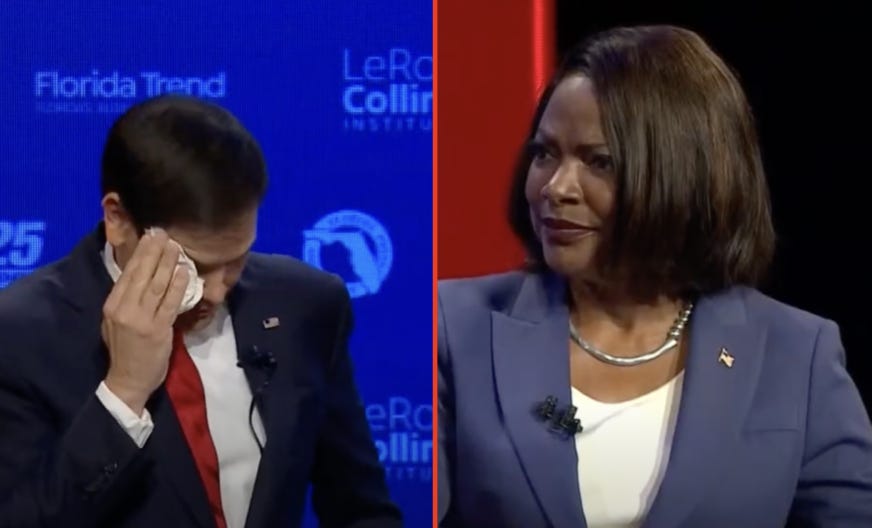Climate Politics Almanac: Climate Debates
How candidates debated climate change in Senate, House, and gubernatorial races
SENATE
In the close-fought Arizona and Georgia U.S. Senate debates, moderators asked exactly zero climate questions, so neofascist Blake Masters and Herschel ‘A Lot of Concussions’ Walker respectively got to skate. Of course, Masters is a conspiracy-theorist climate denier and Walker is even weirder.
Instead of challenging Mehmet Oz’s radical pivot to outright climate denial (“the ideology that carbon is bad is a lie”), moderators in this week’s Pennsylvania Senate debate challenged Democratic Lt. Gov. John Fetterman on his support for fracking despite past misgivings.
In a New Hampshire debate, Democratic Sen. Maggie Hassan’s MAGA challenger Don Bolduc stumbled wildly to dodge a question about climate change, fossil fuels, and Republican climate denial. Bolduc eventually landed on blaming “China, Russia, North Korea, and Japan1” and saying “we don’t have the money” to do anything.
In Hurricane Ian-pummeled Florida, Republican Sen. Marco Rubio was challenged by Rep. Val Demings for his years of climate denial in response to the very first question of the debate:
“We’ve got to get serious about climate change. Climate change is real. If we don’t do something about it, then we’re going to pay a terrible price for it: more intense storms like we’ve seen, as the waters in the ocean continue to warm up.”
Sen. Michael Bennet’s (D-Colo.) challenger, Joe O’Dea, is also a climate denier.
Sen. Catherine Cortez Masto’s (D-Nev.) challenger Adam Laxalt fought lawsuits against the oil industry for its decades of climate deception, and has reaped the rewards with Koch and other oil industry backing.
The Washington Post’s Maxine Joselow has further coverage of climate in the debates in the Ohio (Rep. Tim Ryan vs. Republican J.D. Vance) and Utah (Sen. Mike Lee (R) vs. independent Evan McMullin) Senate races.
HOUSE
In the tight race for Nebraska’s second district, Rep. Don Bacon (R-Neb.) was lambasted by Democratic challenger Tony Vargas in their debate over climate change. Here’s the write-up from Nebraska Public Media’s Bill Kelly:
Moderator Julie Cornell of KETV asked if recent extreme weather, like Nebraska’s drought, should be attributed to a change in the earth’s climate or if these are normal cycles in the weather.
“We need to make sure that we are being honest,” Vargas said. “Climate change is real.”
Bacon was more guarded. “There are some cyclical impacts, and there was clearly some climate change, as well,” he said. “It’s a combination.”
Both candidates felt some government responses to the human components of a warming planet are appropriate.
Bacon said he believed “in the ‘all-of-the-above’ energy approach,” noting his support for fossil fuels, including coal and natural gas, nuclear, geothermal, solar and wind.
Vargas rebuked Bacon, saying it was important to send someone to Congress who would have “a better answer than saying we have ‘some’ climate change” rather than “actually definitively saying climate change is real.”
Lunatic Rep. Matt Gaetz (R-Fla.) is expected to easily defeat his Democratic challenger, climate scientist and whistleblower Rebekah Jones, in his conservative district. In their debate, Gaetz argued that he accepts the science of climate change, but then attacked “radical climate scientists” and Rep. Alexandria Ocasio-Cortez (D-N.Y.).
In Oregon’s Fifth District, Democrat Jamie McLeod-Skinner, who defeated Rep. Kurt Schrader in the primary, emphasized the urgency of the climate crisis: “Our homes are literally burning down. Our family farms are going under.” Her opponent, Lori Chavez-DeRemer, countered with a call for further deregulation of fracking.
GOVERNORS
Emily Atkin covers the Wisconsin gubernatorial debate, in which extremist Tim Michels showed off his brand of climate denial.
In response to a question about climate change and the wildfires ravaging the state, Gov. Michelle Lujan Grisham (D-N.M.) discussed smarter wildfire management, the Inflation Reduction Act’s spending and her support for net-zero carbon pollution by 2050.
In contrast, her Republican challenger, former weatherman Mark Ronchetti—like Oz someone who used to warn about climate change but is now a denier—attacked “far-left, wild-eyed environmentalists.” “We need to log!” Ronchetti went on. “We have the cleanest and most efficient oil and gas industry in the world!”
With Nike billionaire Phil Knight and sore loser Kurt Schrader (see above) backing her opponents, Democratic climate hawk Tina Kotek, who led the passage of the state’s Clean Fuels Program, is trailing Republican Christine Drazan. In their debate, which also included independent spoiler candidate Betsy Johnson, Drazan moderated her previous attacks on climate action, only hinting at her support for fossil fuels with calls for a “strong energy grid.” Kotek criticized Drazan for her attacks on the Clean Fuels Program:
“The number one program we have in the state right now that is reducing our transportation emissions is the Clean Fuels Program. Talking about the electricity grid is great, but she wants to suspend the program because Big Oil doesn’t like it and she’s taking support from Big Oil.”
In New York’s debate, Democratic Gov. Kathy Hochul blasted her challenger, Lee Zeldin, as an all-purpose denier:
“You’ve been an election denier, a climate change denier — you and Donald Trump were the masterful COVID deniers.”
In the Massachusetts debate, Democratic Attorney General Maura Healey discussed “driving a climate agenda through our departments of transportation and energy and housing and economic development.” In contrast, her opponent Geoff Diehl, a former state representative, scoffed at serious climate action: “No fossil fuels, no possible way.”
Japan!




